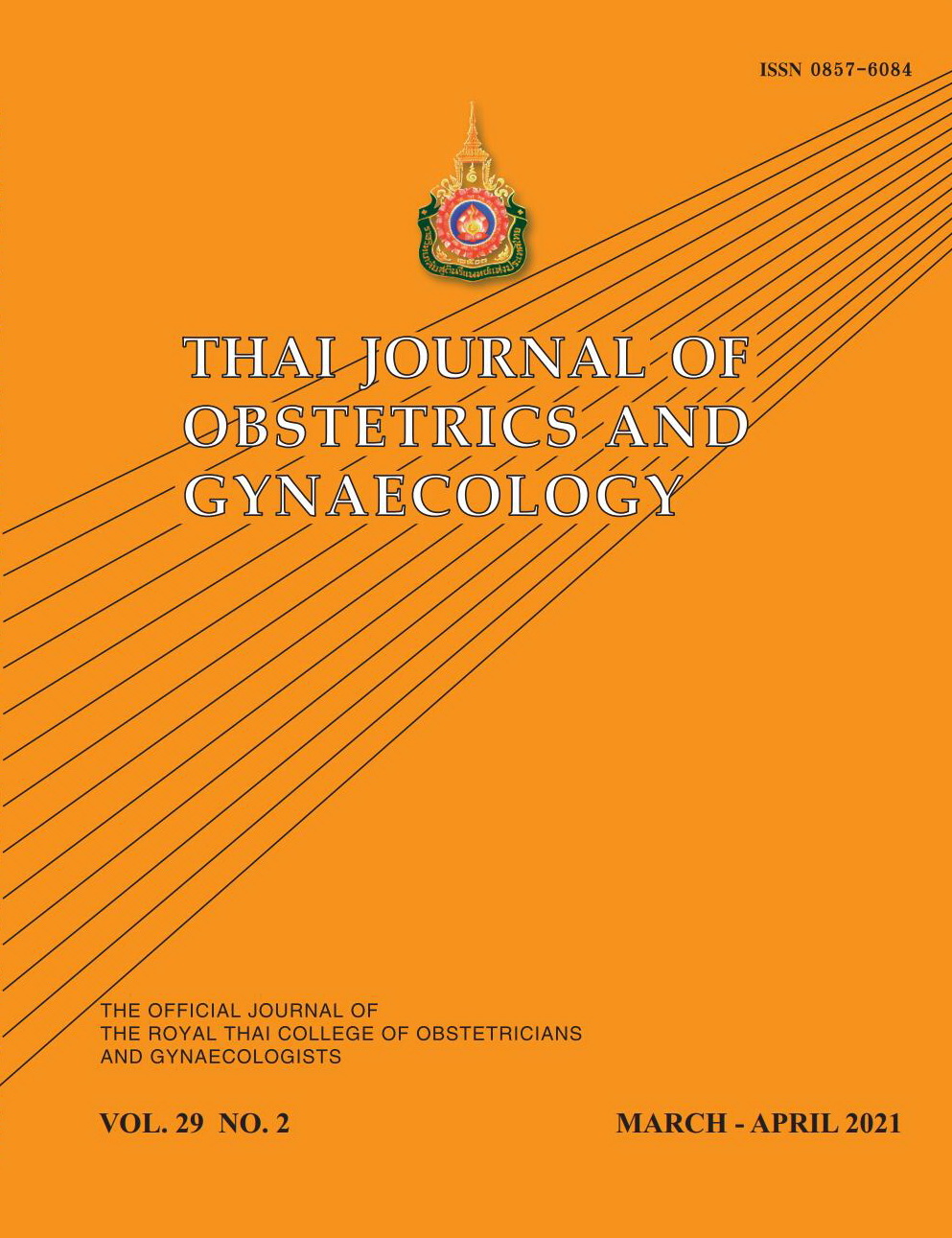Effectiveness of Thai-German Multidisciplinary Endoscopic Training (TG-MET) simulator for laparoscopic training
Main Article Content
Abstract
Objectives: To evaluate effectiveness of Thai-German Multidisciplinary Endoscopic Training (TG-MET) protocol, identify the appropriate practice time and factors affecting the training protocol.
Materials and Methods: A total of 29 obstetrics and gynecology residents who had no laparoscopic surgery experience were enrolled in a 2-week training program. During the training, participants did the 15 minute-test, including moving beans, cutting the paper into star shape, and simple suturing. Evaluation was done at 5 and 10 hours of training by video recording the tests and interpreted by Global Operative Assessment of Laparoscopic Skills (GOALS) score by two experienced laparoscopists. Scores were compared between tests at the beginning, 5 and 10 hours of training. Various characteristics were compared between those who passed and did not pass the tests.
Results: Mean GOALS scores increased significantly at 5 and 10 hours of training (12.3 vs. 18 vs. 19.3, p<0.001). All domains including depth perception, bimanual dexterity, efficiency, tissue handling, and autonomy were significantly improved at 5 hours (p<0.05). However, only depth perception, bimanual dexterity and efficiency were significantly improved at 10 hours. Participants who can play musical instrument had significantly higher rate of passing the tests at 5 hours of training (50% vs 9.1% p=0.044). No associated factors related to passing the exam at 10 hours.
Conclusion: Training with TG-MET protocol can significantly improve laparoscopic skills at 5 hours significantly and tend to reach the plateau at 10 hours. However, the tasks such as depth perception, bimanual dexterity and efficiency still improved at 10 hours.
Article Details
References
2. Vitish-Sharma P, Knowles J, Patel B. Acquisition of fundamental laparoscopic skills: is a box really as good as a virtual reality trainer? Int J Surg 2011;9:659-61.
3. Samia H, Khan S, Lawrence J, Delaney CP. Simulation and its role in training. Clinics in colon and rectal surgery 2013;26:47-55.
4. Nagendran M, Toon CD, Davidson BR, Gurusamy KS. Laparoscopic surgical box model training for surgical trainees with no prior laparoscopic experience. Cochrane Database of Systematic Reviews 2014.
5. Supe A, Prabhu R, Harris I, Downing S, Tekian A. Structured training on box trainers for first year surgical residents: does it improve retention of laparoscopic skills? A randomized controlled study. J Surg Educ 2012;69:624-32.
6. Vassiliou MC, Feldman LS, Andrew CG, Bergman S, Leffondre K, Stanbridge D, et al. A global assessment tool for evaluation of intraoperative laparoscopic skills. Am J Surg 2005;190:107-13.
7. Malik AA, Ayyaz M, Afzal MF, Ali AA, Shamim R, Khan R, et al. Use of box simulators for improving intraoperative laparoscopic skills - an essential tool for the surgeon in training. J Coll Physicians Surg Pak 2015;25:172-5.
8. Sroka G, Feldman LS, Vassiliou MC, Kaneva PA, Fayez R, Fried GM. Fundamentals of laparoscopic surgery simulator training to proficiency improves laparoscopic performance in the operating room-a randomized controlled trial. Am J Surg 2010;199:115-20.
9. Salkini MW, Hamilton AJ. The effect of age on acquiring laparoscopic skills. J Endourol 2010;24:377-9.
10. Van Hove C, Perry KA, Spight DH, Wheeler-Mcinvaille K, Diggs BS, Sheppard BC, et al. Predictors of Technical Skill Acquisition Among Resident Trainees in a Laparoscopic Skills Education Program. 2008;32:1917-21.
11. Rosser JC, Jr., Lynch PJ, Cuddihy L, Gentile DA, Klonsky J, Merrell R. The impact of video games on training surgeons in the 21st century. Arch Surg 2007;142:181-6; discusssion 6.
12. Nomura T, Miyashita M, Shrestha S, Makino H, Nakamura Y, Aso R, et al. Can interview prior to laparoscopic simulator training predict a trainee's skills? Journal of surgical education 2008;65:335-9.
13. Boyd T, Jung I, Sickle K, Schwesinger W, Michalek J, Bingener J. Music Experience Influences Laparoscopic Skills Performance. JSLS : Journal of the Society of Laparoendoscopic Surgeons / Society of Laparoendoscopic Surgeons 2008;12:292-4.
14. Powers TW, Bentrem DJ, Nagle AP, Toyama MT, Murphy SA, Murayama KMJSE, et al. Hand dominance and performance in a laparoscopic skills curriculum. 2005;19:673-7.


